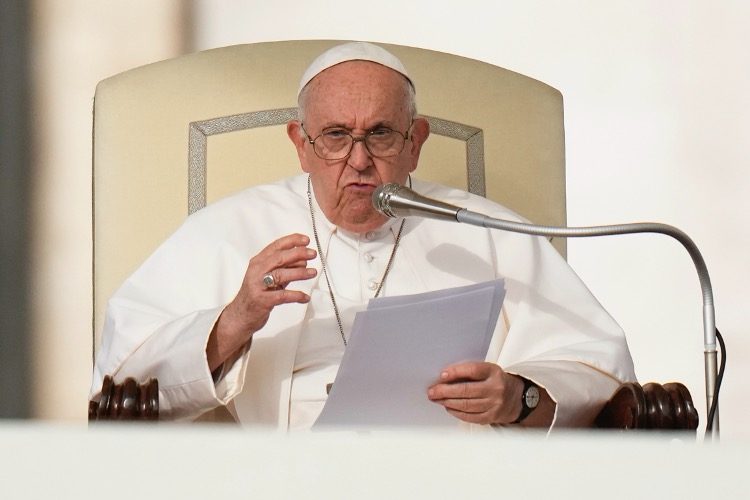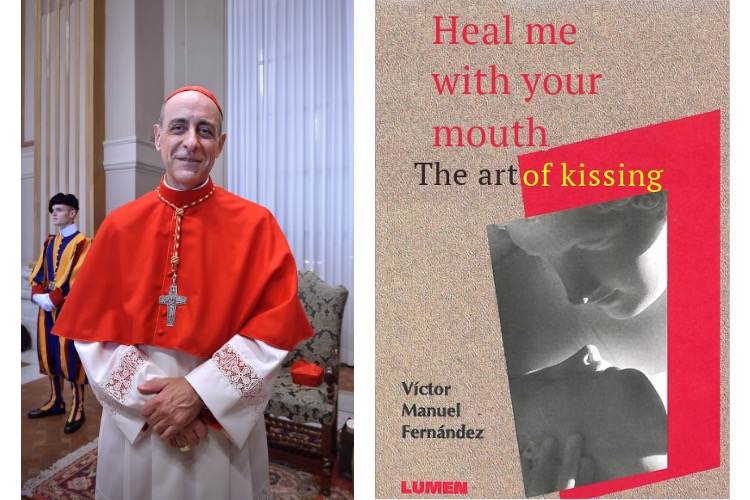
Worldwide Catholic opposition to the Vatican’s pre-Christmas declaration allowing blessings for same sex couples continues to escalate since the revolutionary papal document was issued. Fiducia Supplicans (“Supplicating Trust”) was released on December 18, one week before Christmas, by the Dicastery for the Doctrine of the Faith (DDF) headed by the recently installed Cardinal Víctor Manuel “Tucho” Fernández of Argentina. Fernandez, a controversial and heterodox Jesuit, is a longtime friend, protégé, and advisor of Pope Francis, dating back to the pope’s years as Archbishop Jorge Bergoglio in Buenos Aires. Fernandez’s “liberal” views on sexuality stirred concerns as far back as 1995, when he became known as “the Kissing Priest” due to his authorship of the now-infamous erotic book, Heal Me With Your Mouth: The Art of Kissing.

His appointment as titular archbishop of Tiburnia, Italy, in May of 2013, (Pope Francis’s first episcopal consecration) was viewed by Vatican watchers as an unmistakable signal of seismic changes to come. Fernandez has served as the main ghostwriter for Francis’s most radical documents: Laudato Si on global warming and the environment (2015) and Amoris Laetitia on marriage and the family (2016). In 2018, he was elevated to the archbishopric of La Plata, Argentina. In 2023, Pope Francis named him prefect of the Dicastery for the Doctrine of the Faith and bestowed on him a cardinal’s red hat.
“Scandalous,” “self-contradictory,” “deceitful,” “blasphemous”
According to Cardinal Fernández, the new directive on blessings, Fiducia Supplicans (subtitled “On the Pastoral Meaning of Blessings”), “remains firm on the traditional doctrine of the Church about marriage,” and does not allow “any type of liturgical rite or blessing similar to a liturgical rite that can create confusion.”
That is not how many Catholic prelates, theologians, and lay faithful see it. Cardinals, bishops, and national conferences of Catholic clergy are denouncing the proposed formula for blessings as “confusing,” “disingenuous,” “scandalous,” “self-contradictory,” “deceitful,” “blasphemous,” “a great deception,” and replete with “diabolical ambiguity,” “cunning sophistries,” “casuistry,” and “dissimulation.”
The Catholic bishops of Africa have been especially vigorous in rejecting any move toward normalizing sodomy under the guise of “pastoral accompaniment.” The bishops conferences of Zambia, Malawi, Nigeria, Togo, Cameroon, Zimbabwe, Rwanda, Gabon, Angola, São Tomé and Príncipe, Mozambique, Niger, Burkina Faso, and Ghana have made it known they do not intend to implement the “innovative” new Fernandez-Bergoglio theology. They have been joined by cardinals, bishops, bishop conferences, and priestly confraternities from Hungary, Poland, Ukraine, Kazakhstan, Peru, Uruguay, Australia, Brazil, and Argentina. Except for a few notable exceptions, the response from U.S. bishops, by comparison, has been milquetoast.
Wote vs. “Woke”
“I hereby prohibit all priests in the Catholic Diocese of Wote from blessing couples in irregular situations or same-sex couples,” Bishop Paul Kariuki Njiru of the Catholic Diocese of Wote, Kenya, said in a letter to his diocese on December 27, 2023. “I am of the opinion that Cardinal Víctor Manuel Fernández of the Dicastery of Doctrine of Faith should have widely done enough consultation before releasing such a controversial declaration,” Bishop Njiru continued. He noted that “this declaration totally contradicts what Pope Francis himself approved in 2021 concerning same-sex unions,” referring to the orthodox ruling by the same Dicastery for the Doctrine of the Faith two years earlier, which stated, “It is not licit to impart a blessing on relationships, or partnerships, even stable, that involve sexual activity outside of marriage … as is the case of the unions between persons of the same sex.”
Blessing Sin: The Great Reversal
The 2021 DDF response to questions about blessings further restated traditional Christian moral theology: “God Himself never ceases to bless each of His pilgrim children in this world…. But he does not and cannot bless sin: He blesses sinful man, so that he may recognize that he is part of His plan of love and allow himself to be changed by Him.”
That response was written by Cardinal Luis F. Ladaria Ferrer, Fernández’s predecessor as prefect of the DDF. As expected, his confirmation of Biblical and Church teaching on adultery and sodomy inflamed “progressive” clerics in the Church and their militant LGBTQ lobby allies. Thus, Ladaria Ferrer (who is no conservative) had to go, and with him all vestiges of pre-Francis moral theology. It seemed to be a sure thing among the Vatican press corps that Pope Francis was going to appoint Germany’s radical Bishop Heiner Wilmer as Ladaria’s replacement. To great surprise, however, Bishop Wilmer was passed over in favor of Fernández. That was probably due to Wilmer’s high media profile among the far-left German bishops, whose boisterously heretical tantrums were then jeopardizing the charade surrounding the wildly woke Synod on Synodality, which Team Francis was taking pains to pass off as the authentic voice of “the People of God.” A Bishop Wilmer-led DDF would have been disastrous for the Catholic Church, but has Archbishop (now Cardinal Prefect) Fernández’s leadership proven to be any less so?
Bishop Njiru says “what is disturbing” in Fiducia Supplicans “is that, on one hand, it directs the priests to bless these couples without specifying what exactly is being blessed, while on the other hand, it expressly forbids any ritual text that might specify it. For Pastoral reasons, I therefore, exhort my priests to invite those couples to a life of conversion by the words of the Gospel ‘Repent, and believe in the Gospel’ (Mark 1,14).”
Bishop Njiru concludes by saying, “The Declaration of the Dicastery for the Doctrine of the Faith “FIDUCIA SUPPLICANS” should be rejected in totality and we faithfully uphold the Gospel teachings and Catholic traditional teachings on Marriage and sexuality.” (Emphasis in original.)
“We Are not Idiots. We Know Your Ultimate Goal.”
Bishop Martin Mtumbuka of Karonga Diocese in Malawi has provided one of the most impassioned and eloquent defenses of orthodox opposition to Fiducia Supplicans. In a video-recorded homily on December 24, he urged the faithful of his diocese to “forget and ignore this controversial and apparently blasphemous declaration in its entirety.”
“Do pastors do things like this in good faith? Or was this document written mainly to gain cheap popularity?” the Malawian Catholic Bishop asked. “It would seem in many parts of the world, certainly many people have celebrated this document as a sign of progress in the church, and the popularity of its drafters has certainly increased,” he said.
Bishop Mtumbuka declared that Fiducia Supplicans “looks to us like a heresy; it reads like a heresy; and it effects heresy.” He expounded further:
The document asks us to bless two people of same sex as individuals, but not as a couple. So, these two people of same sex who the previous night slept together like a couple, and present themselves to us as a couple are blessed as individuals, but they leave our presence as a couple; they go to their homes as a couple; they sleep in the same bed as a couple; but the document says they’re not blessed as a couple, although they appear to have been blessed like a couple. How could this be not changing the authentic teaching of the Church?
“It’s sad,” Bishop Mtumbuka lamented. “The Catholic Church is old, as old as Christianity itself; this has never happened before. But we have no choice; we cannot allow such an offensive and apparently blasphemous declaration to be implemented in our Dioceses.”
“We Formally Forbid All Blessings of ‘Homosexual Couples’”
“We, the Bishops of Cameroon, reiterate our disapproval of homosexuality and homosexual unions,” the National Episcopal Conference of Cameroon (NECC) declared in its two-page, nine-point statement of December 21, 2023. “Consequently, we formally forbid all blessings of ‘homosexual couples’ in the Church of Cameroon.” The Cameroonian bishops particularly take umbrage with the DDF declaration’s tortured effort to create an “innovative” distinction without a difference between same-sex “unions” and “couples,” and between “pastoral” and “liturgical” blessings. The NEEC statement says that “Differentiating between liturgical and non-liturgical contexts in order to apply the blessing to same sex ‘couples’ is hypocritical.” “We therefore declare non-compliant any form of blessing, public or private, that tends to recognize ‘same-sex couples’ as a state of life,” the bishops state.
Of course, Fiducia Supplicans was not universally condemned. As could be predicted, there was plenty of rejoicing among pro-LGBTQ+ “Catholic” politicians, bishops, priests, and NGO activists, all of which was generously covered by the pro-LGBTQLMNOP+++ Fake News media. Thankfully, however, there has also been an outpouring of criticism by faithful Catholic cardinals, bishops, priests, theologians, scholars, and commentators. Naturally, these expressions of well-reasoned disapproval have received little to no media coverage or have been demeaned as rantings of “rigid” ideologists who are lacking in love and compassion. Below is a sampling of excerpts from statements critical of Fiducia Supplicans:
“All Clergy residing and ministering in the Archdiocese of Nairobi are prohibited from blessing irregular relationships, unions, or same-sex couples…. Any form of blessing of same-sex unions and activities would go against God’s word, the teachings of the Church, the African cultural traditions, the laws of our nations, and would be scandalous to the faithful.” — Archbishop Philip Anyolo of Nairobi, Kenya
“The fact that the document does not give permission for the ‘marriage’ of same-sex couples should not blind pastors and faithful to the great deception and the evil that resides in the very permission to bless couples in irregular situations and same-sex couples. Such a blessing directly and seriously contradicts Divine Revelation and the uninterrupted, bimillennial doctrine and practice of the Catholic Church. To bless couples in an irregular situation and same-sex couples is a serious abuse of the most Holy Name of God, since this name is invoked upon an objectively sinful union of adultery or of homosexual activity…. With such blessings, the Catholic Church becomes, if not in theory, then in practice, a propagandist of the globalist and ungodly ‘gender ideology.’” — Tomash Peta, Metropolitan Archbishop of the Archdiocese of Saint Mary in Astana, Kazakhstan, and Athanasius Schneider, Auxiliary Bishop of the Archdiocese of Saint Mary in Astana, Kazakhstan
“Blessings for same sex unions of any kind are not permitted in Malawi.” — Catholic Bishops of the Episcopal Conference of Malawi
“The Dicastery of the Doctrine of the Faith has become a Dicastery of confusion. This is precisely what the Argentinean Cardinal Víctor Manuel Fernández promotes. Not only the confusion of the faithful, but also of world opinion…. In conclusion: Fiducia Supplicans should not be obeyed. And it is perfectly correct to deny blessings to homosexual ‘marriages,’ and to marriages living in an irregular situation.” — Archbishop Emeritus Hector Aguer, La Plata, Argentina
“Truths are eternal and do not change with the zeitgeist. The other way around: popes and bishops bring nothing of their own but interpret the constant faith of the church on the line of tradition without breaking with it. It remains that a sinful practice and connection cannot be blessed because it is in the order of creation or the will of God and in such a case the blessing can neither be fruitfully administered nor received.” — Bishop Emeritus Marian Eleganti of Chur, Switzerland
“Notice that not only sinful persons are blessed here, but that by blessing the couple, it is the sinful relationship itself that is blessed. Now, God cannot send his grace upon a relationship that is directly opposed to him and cannot be ordered toward him…. The difficulty of blessing a union or couple is especially evident in the case of homosexuality. For in the Bible, a blessing has to do with the order that God has created and that he has declared to be good. This order is based on the sexual difference of male and female, called to be one flesh. Blessing a reality that is contrary to creation is not only impossible, it is blasphemy.” — Cardinal Gerhard Müller, Prefect Emeritus of the Dicastery for the Doctrine of the Faith
“Deliberate or persistent ambiguity — anything that fuels misunderstanding or seems to leave an opening for objectively sinful behavior — is not of God. And it inevitably results in damage to individual souls and to our common Church life…. The document [Fiducia Supplicans] is a doubleminded exercise in simultaneously affirming and undercutting Catholic teaching on the nature of blessings and their application to “irregular” relationships…. Relationships that the Church has always seen as sinful are now often described as ‘irregular.’ This neuters the reality of morally defective behavior and leads to confusion about what we can and can’t call ‘sin.’” — Archbishop Charles J. Chaput, Archbishop Emeritus of Philadelphia
“Basing itself on Sacred Scripture, which presents homosexual acts as acts of grave depravity, tradition has always declared that ‘homosexual acts are intrinsically disordered.’ They are contrary to the natural law. They close the sexual act to the gift of life. They do not proceed from a genuine affective and sexual complementarity. Under no circumstances can they be approved…. We see no situation in which such a blessing of a couple could be properly and adequately distinguished from some level of approval. Thus, it would inevitably lead to scandal.” — Confraternity of Catholic Clergy of the United Kingdom
“Although it purports to avoid any confusion between the blessing of such illegitimate unions and that of a marriage between a man and a woman, this declaration avoids neither confusion nor scandal: not only does it teach that a minister of the Church can call down God’s blessing on sinful unions, but by doing so, it actually reinforces these situations of sin… All the convoluted language and sophistical dressing up of the document of the Dicastery for the Doctrine of the Faith cannot hide the elementary and obvious reality of these blessings: they will do nothing more than reinforce these unions in their intrinsically sinful situation, and encourage others to follow them.” — Fr. Davide Pagliarani, Superior General of the Society of Saint Pius X
“There is the appearance of reason, but also a great deal of jargon, sophistry, and deceit…. To bless couples in irregular marriages or same-sex couples without giving the impression that the Church is not validating their sexual activity is a charade. All those present at such blessings know, without a doubt, that such relationships are sexual in nature. No one is fooled. Actually, they are rejoicing that such sexual relations are being blessed. That’s the point of these blessings. It is not their sexual abstinence being blessed, but their sexual indulgence…. Attempting immorally to exploit God’s blessings makes a mockery of his divine goodness and love.” — Fr. Thomas G. Weinandy, OFM, theologian and former member of the Vatican’s International Theological Commission
“A gay Christian can be blessed individually. But one cannot bless a gay relationship because the Church characterizes it as disordered, or sinful. This disordered character is affirmed, but nevertheless the declaration says that blessing such relationships is a possibility. In other words, blessing a sinful relationship is possible. God giving His blessing on a sin, it is a travesty!” — Bishop Robert Mutsaerts, the auxiliary bishop of the Diocese of ‘s-Hertogenbosch in the Netherlands
“We see no situation in which such a blessing of a couple could be properly and adequately distinguished from some level of approval of the irregular relationship, leading to the scandal of the faithful.” — U.S. Marian Fathers of the Immaculate Conception
“The first, and most serious, problem in Fiducia Supplicans (FS) is the choice of the word ‘couple’ to describe two people of the same sex who engage in sodomy within an ongoing publicly known, self-proclaimed committed relationship, such as a civil marriage…. There are absolutely no grounds for considering homosexual unions to be in any way similar or even remotely analogous to God’s plan for marriage and family…. The use of the word couple is in fact a surrender to the heretical ideology that proclaims that homosexual couples are just as much couples as are heterosexual couples.” — Fr. Gerald E. Murray, author, canon lawyer, the pastor of Holy Family Church in New York City, commentator on EWTN
“Sinful behavior and disordered inclinations can never be blessed or condoned. Even the appearance of endorsement of any moral evil must be avoided at all cost lest one infer that the one giving the ‘blessing’ is also a formal cooperator in evil, which is always forbidden.” — Confraternity of Catholic Clergy (USA)
“The ambiguity of this declaration — which lends itself to many interpretations & manipulations — is causing much perplexity among the faithful & I believe that … we need to speak out clearly on this issue in order to give clear guidance to our Christians.” — Cardinal Fridolin Ambongo Besungu of Kinshasa, Congo, President of the Symposium of Episcopal Congeences of Africa & Madagascar (SECAM)
“We really simply need to be a united voice saying, ‘no,’ we will not respond to this…. We will not incorporate this into the life of the Church because we simply must say ‘no.’ And it needs to be a united voice.” — Bishop Joseph Strickland, Bishop Emeritus of the Diocese of Tyler, Texas
“Any misappropriation of the teaching office of the Church in a way that normalizes sin contributes to leading people further from Jesus’ loving heart rather than closer to it and must be repudiated…. There should be no ambiguity as regards this truth: the ministers of the Church have no power to bless sin. To do so would be a perversion of the very purpose of a blessing. Any person or persons willfully choosing to act contrary to the teachings of the Deposit of Faith may receive a blessing asking God for the grace of conversion to live in full accord with his revealed truths in Scripture and Tradition. Any sort of blessing that would give the semblance of condoning sin is not to be granted.” — Bishop Peter M. Muhich, Rapid City, South Dakota, and Bishop Donald E. DeGrood, Sioux Falls, South Dakota



